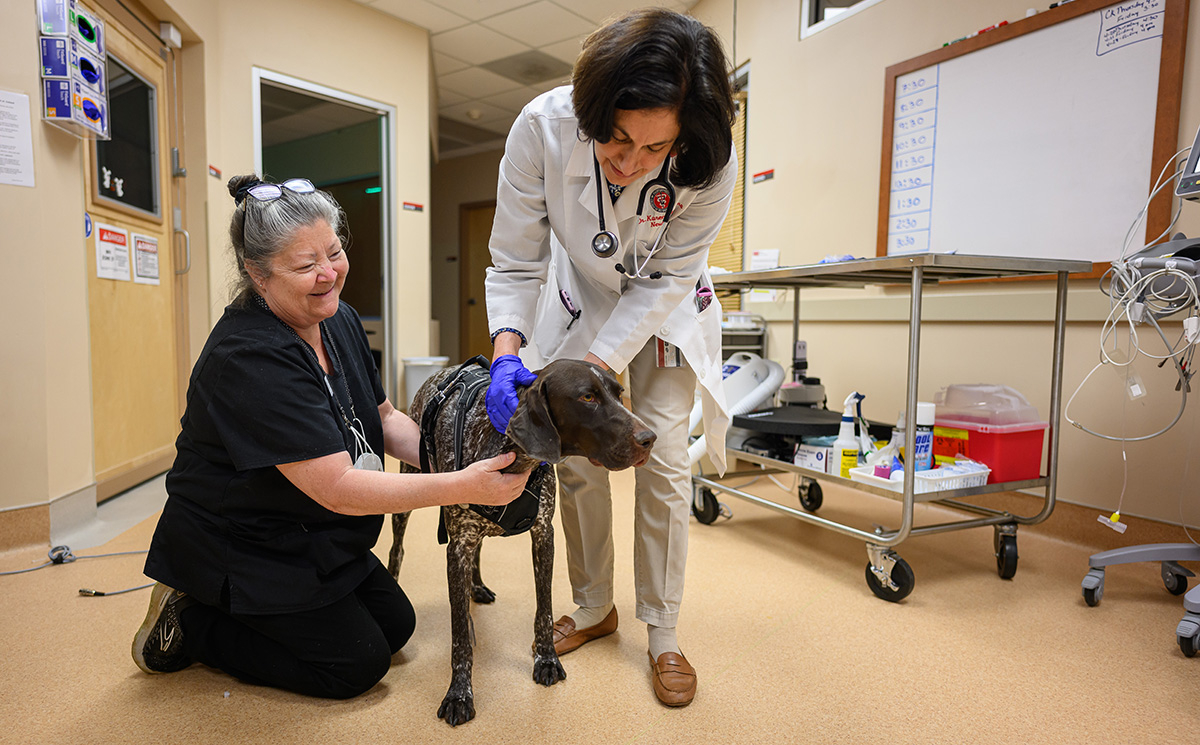New Fitness Program
Changes in the State Health Plan that threaten to penalize some overweight employees starting in 2011 raise the question: What’s available at work to help faculty and staff members lose weight and live healthier lives? A check of the resources available online through the university and the State Health Plan can easily leave you underwhelmed by the choices. More on that later.
But, on the bright side, NC State employees are showing what can be done, on their own, to improve their health and fitness.
Last Wednesday, a half-dozen employees in the College of Natural Resources (CNR) gathered in a meeting room in Jordan Hall for 45 minutes of Zumba, an aerobic exercise class featuring high energy dance moves performed to a sassy Latin rhythm. Volunteer instructor Madison Owen, a graduate student in textiles who is certified to teach the exercise regimen, kept the class moving and grooving.
“Roll, roll, roll, pop, pop,” she sang as the group stepped to the left and jumped.
The participants, all women over 40 of varying sizes and dance skills, kept the workout fun. They were excited to hear a running translation of the song’s lyrics from a co-worker who spoke Spanish. “It’s a love story,” she told them to general amusement. “He’s talking about his dark-skinned cutie.”
Laughter, it seems, is a big part of the program. Participants teased each other when they missed a series of complex moves and joked about which of them was the “Queen of Zumba.”
Owen may be a generation behind her classmates, but she shared an easy camaraderie with them.
“I love y’all’s facial expressions,” she called over her shoulder during a segment called sleepy leg. “I hear heavy breathing. That’s a good sign.”
The program, called CNR Fit for Life, was launched last May to give employees in the college a free and easy option for exercising during their lunch break. Participants meet Monday through Thursday from noon to 12:45 p.m. in Jordan Hall for a variety of activities, including yoga, Pilates and Tae Bo, as well as low impact aerobics and strength training. They also hear lectures from guest speakers on nutrition, stress management and other health topics and take field trips, like the excursion they recently made to University Dining for tips on preparing healthy meals.
Great Results
The results have been impressive. A participant named Ellen confided that her fitness level has improved dramatically since she began the program.
“My stamina has increased, my back and knees are better, my asthma is better and I’m sleeping better,” she said. “I can climb stairs without huffing and puffing now.”
The program works for a couple of reasons, not the least of which is the support and encouragement it receives from CNR Dean Robert Brown.
“I think it’s great, wonderful,” he said Monday. “It’s impressive that the group has stayed with it, which is not easy to do when it comes to exercise. The feedback has been positive from everybody.”
Brown said the idea for the program came earlier this year when the State Health Plan announced that it would reduce coverage for members who have a body mass index above a certain number: 40 in 2011 and 35 in 2012. He asked his staff to look into the worksite wellness programs available on campus and found there wasn’t much. The university’s Shape U program, a five-week exercise program offered in January, was no longer available, he learned. New programs were being discussed, but hadn’t been organized.
“Why can’t we have our own program?” he suggested.
Focus on Body, Mind and Spirit
Susan Colby, student services coordinator in the PGA golf management program, stepped up and offered to organize the activities. As a one-time health and wellness director at the YMCA, Colby has lots of experience running wellness programs. Although the program started out in response to the health plan changes, she explained, it’s evolved well beyond that.
“Weight loss is no longer the main focus,” she said. “It’s getting up and moving, taking time to take care of ourselves physically, which also plays a role in stress relief and mental and emotional health. It has become an overall body, mind and spirit program.”
The college is lucky to have employees like Colby and Thomas Easley, CNR’s director of diversity, who have a background in health and fitness. Easley has volunteered to assist in teaching cardio and strength training programs.
Colby said the dean’s support has been critical to the success of the program.
“It has to come from the top, down. You have to take the programs to the people,” she said. “You can’t expect people to find the programs.”
That’s true in theory. But in practice, that’s exactly what the State Health Plan has in mind. Its wellness program, called NC HealthSmart, doesn’t run wellness or fitness programs, but offers an online toolkit with suggestions on healthy eating and activities. It encourages employees to use the stairs instead of the elevator, for example, and lets you download posters, like one that says, “Buy a Kid Size Meal and Enjoy the Toy.”
Pushing Happy Meals doesn’t seem like the textbook way to promote weight loss, but at least the posters are free.
What Else on Campus?
Here on campus, a few worksite wellness programs are offered. Wolflife Wellness, the university’s worksite wellness portal, lists three active weight management programs, none of which are free:
- Eat Smart, Move More, Weigh Less. A 15-week program developed by cooperative extension that provides group classes with information on weight management and healthy living. No classes have been organized on campus at this time but some may be offered in January. Cost is $30 (but $25 will be refunded if you attend 10 classes).
- Weight Watchers at Work. A 17-week program designed to help you lose weight. Offered on campus on an ongoing basis. Anyone interested can attend an open house meeting on Centennial Campus. Cost is $186 for 17 weeks. For more information about meeting times and locations, contact Sue Cross at 515-7036 or sue_cross@ncsu.edu.
- Taking Off Pounds Sensibly (TOPS). A weight-loss support group that has open enrollment periods where interested employees may attend a free introductory meeting. An annual membership is $24, plus a $2 monthly chapter fee. For more information, contact Lynda Hambourger at lynda_hambourger@ncsu.edu.
Carmichael a Good Value
For exercise options, employees are encouraged to join the Carmichael Complex, which includes a fitness center, exercise classes and gymnasium for as little as $15 a month.
Brown endorses the idea of employees joining Carmichael and notes that CNR has the highest percentage of Carmichael members of any college. But, he added, not everyone feels comfortable working out in a fitness center. Time may also be a factor for many employees. By the time you drive to Carmichael, find parking and change into your workout clothes, you may not have much time to exercise during your lunch break.
Extension employees outside the Triangle area don’t have access to Carmichael and other campus resources. For them, choices are limited. Groups of 20 or more may sign up for Weight Watchers at Work, but don’t look for the university to assist you in coordinating the program. As with the State Health Plan’s online toolkit, you’re on your own.
Maybe it shouldn’t be that way. For his part, Brown encourages other colleges and units at NC State to consider offering lunchtime exercise and wellness programs.
“Obesity is a real problem,” he noted. “A lot of us have pretty sedentary jobs. The whole university needs to get behind this.”
- Categories:


